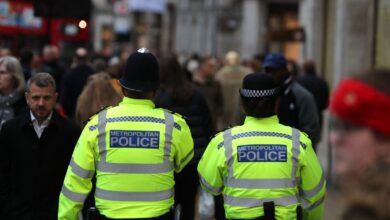Ukraine war: British volunteers who travel to fight Russia could violate terror laws but prosecutions unlikely

Britons fighting against Russia alongside Ukrainian forces could fall under the UK’s definition of terrorism, a watchdog has said after the foreign secretary backed volunteers.
Liz Truss said she would “absolutely” support British nationals who travel to the warzone following an invitation by president Volodymyr Zelensky to international combatants.
A statement issued by Ukraine’s defence ministry on Sunday announced the formation of an international legion and said people could enlist through embassies in their home countries.
“Anyone who wants to join the defence of Ukraine, Europe and the world can come and fight side by side with the Ukrainians against the Russian war criminals,” it added.
Asked on the BBC’s Sunday Morning programme if she would support UK citizens who chose to answer the call, Ms Truss said: “That is something people can make their own decisions about.
”The people of Ukraine are fighting for freedom and democracy, not just for Ukraine but for the whole of Europe.
“Absolutely, if people want to support that struggle I would support them in doing that.”
But fighting overseas has previously been prosecuted under terrorism laws, which saw charges against people who joined UK-based Kurdish groups to defeat Isis.
The Terrorism Act 2000 defines terrorism as the use or threat of violence, to influence a government or the public, “for the purpose of advancing a political, religious, racial or ideological cause”.
Jonathan Hall QC, the Independent Reviewer of Terrorism Legislation, said fighting in Ukraine would be captured by the definition but prosecutions appear unlikely.
“Russia’s aggression against the international legal order, and the importance of supporting Ukraine, makes any support for foreign fighters who want to travel to Ukraine at first glance attractive,” he told The Independent.
“Given the government’s apparent support, prosecution of foreign fighters against Russia under terrorism legislation appears to be a non-starter even if the broad statutory definition of terrorism is satisfied in these cases.
“But there is always the possibility of less desirable cases at the edges – individuals who travel to Ukraine under false pretence either to support Russia or fight with an ideological group such as the [neo-Nazi] Azov battalion.”
Crown Prosecution Service (CPS) guidance states that people who travel from the UK overseas to participate in fighting, “may be caught by the provisions of section 1 of the Terrorism Act 2000”.
It says that individual circumstances, including the location, purpose and intention of the fighting, would be considered but concludes: “If individuals decide to travel overseas to take part in fighting, if not in accordance with a properly authorised UK government operation, then it is likely that the public interest would be in favour of prosecution.”
British authorities attempted a string of failed prosecutions for volunteers who fought against Isis alongside the Kurdish People’s Protection Units (YPG) in Syria.
Almost all terror charges were dropped before trial or ended in acquittals, and the cases sparked scrutiny over the use of terror laws against a group that was militarily backed by the UK.
Any charges relating to alleged terrorism offences committed overseas, or connected with the affairs of another country, can only be brought with the approval of the attorney general and director of public prosecutions.
Pippa Woodrow, a barrister who represented two of the anti-Isis volunteers charged with terror offences, said the enforcement of the laws was subject to “political whim”.
Aidan James was the first British national to be convicted with a terror offence after fighting with anti-Isis groups





